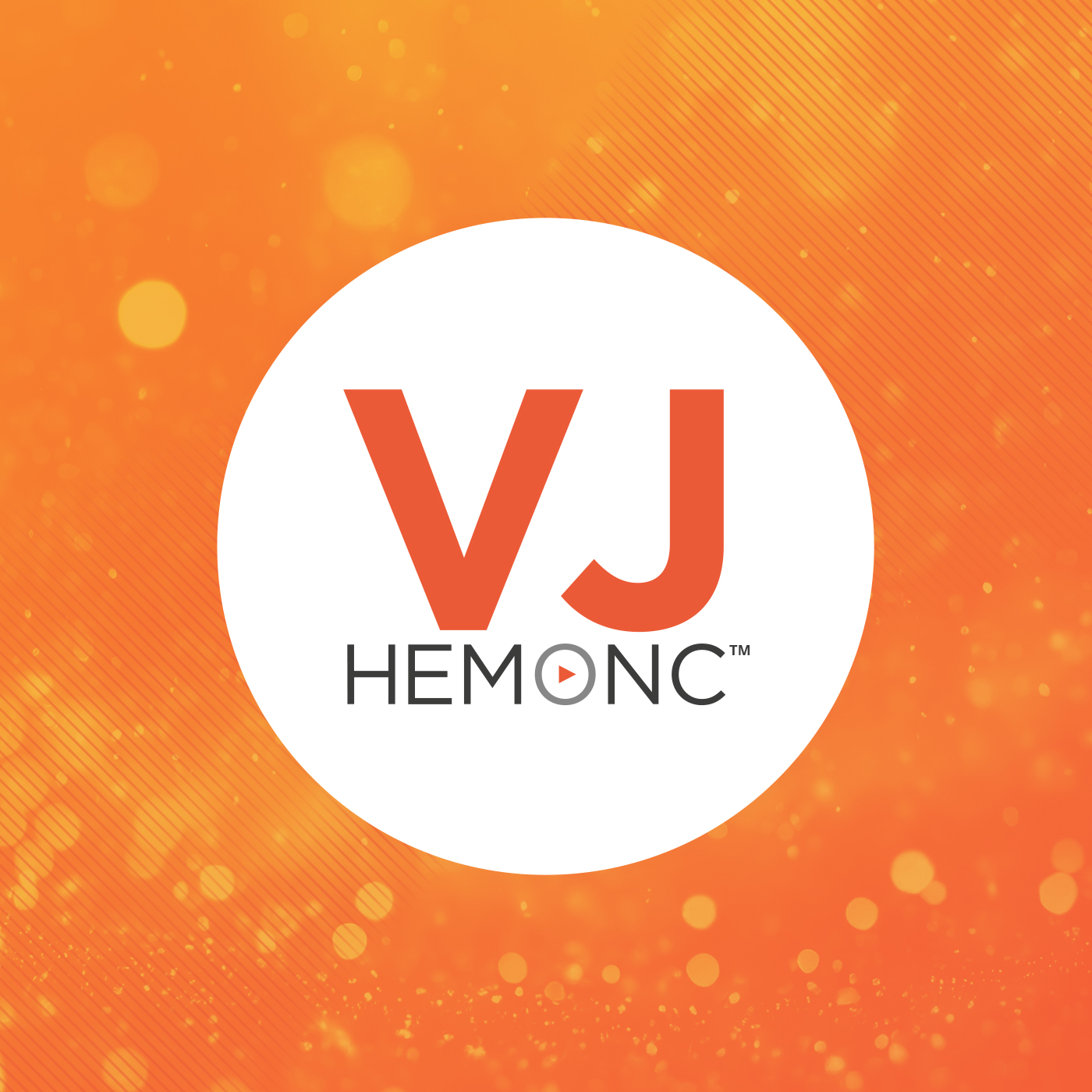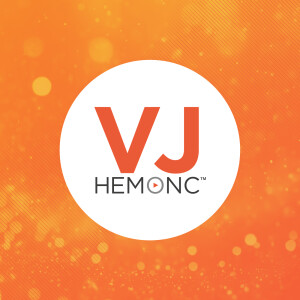
75.4K
Downloads
318
Episodes
The Video Journal of Hematology and Hematological Oncology (VJHemOnc) podcast covers the latest hematological oncology and hematology news from international experts – from leukemias, lymphomas, MDS and MPNs, to sickle cell, aplastic anemia and rare diseases. Made for healthcare professionals and researchers, we are a global, independent, open-access platform. Listen to the latest news, including cutting-edge trial updates, controversies and opinion. If you enjoy the podcast, please leave us a rating and review! For more news visit www.vjhemonc.com
The Video Journal of Hematology and Hematological Oncology (VJHemOnc) podcast covers the latest hematological oncology and hematology news from international experts – from leukemias, lymphomas, MDS and MPNs, to sickle cell, aplastic anemia and rare diseases. Made for healthcare professionals and researchers, we are a global, independent, open-access platform. Listen to the latest news, including cutting-edge trial updates, controversies and opinion. If you enjoy the podcast, please leave us a rating and review! For more news visit www.vjhemonc.com
Episodes

Wednesday Sep 07, 2022
The need for more effective first-line therapies in MDS
Wednesday Sep 07, 2022
Wednesday Sep 07, 2022
The treatment and management of myelodysplastic syndromes (MDS) remains a challenge due to the heterogeneity of the disease, and early diagnosis and intervention are important factors in MDS. Several experts agree that there is a need to develop more effective first-line therapies, and numerous clinical trials are exploring novel agents and combinations that may improve patient outcomes.
In this exclusive podcast, you will hear from Uwe Platzbecker, MD, University of Leipzig, Leipzig, Germany, Daniel Starczynowski, PhD, Cincinnati Children’s Hospital, Cincinnati, OH, Naval Daver, MD, University of Texas MD Anderson Cancer Center, Houston, TX, and David Sallman, MD, Moffit Cancer Center, Tampa, FL, who share their thoughts on why there are fewer treatment options for MDS patients compared to other hematological malignancies, the promise of CAR-T therapy and CD47 antibodies in MDS treatment, and more.

Friday Sep 02, 2022
Myeloma 2022: day two highlights
Friday Sep 02, 2022
Friday Sep 02, 2022
There were several fascinating sessions and discussions at the Myeloma 2022 meeting that took place in Scottsdale, AZ. Topics that were covered include: the role of genomics in the age of immuno-oncology, novel targets and agents, T-cell engagers, and resistance to immunotherapies.
In this podcast, Gareth Morgan, MD, PhD, FRCP, FRCPath, NYU Langone Health, New York, NY, Rafael Fonseca, MD, Mayo Clinic, Phoenix, AZ, Leif Bergsagel, Mayo Clinic, Phoenix, AZ, and Keith Stewart, MB, ChB, Princess Margaret Cancer Centre, Toronto, Canada, share their highlights from day two of the Myeloma 2022 meeting. The experts cover several topics, including the biology behind BCL2 inhibitors, T-cell exhaustion and its role in resistance to immunotherapies, and more.

Wednesday Aug 31, 2022
The promise of CAR-T therapy in CLL and challenges in the field
Wednesday Aug 31, 2022
Wednesday Aug 31, 2022
The treatment landscape of chronic lymphocytic leukemia (CLL) has greatly transformed over the years with the introduction of several agents, including Bruton's tyrosine kinase (BTK) inhibitors, the BCL-2 inhibitor venetoclax, and anti-CD20 antibodies. CAR-T cell therapy has also improved treatment options for patients with various other hematological malignancies, although there are several barriers to the use of CAR-T therapy in CLL.
In this exclusive podcast, you will hear from experts John Gribben, MD, DSc, FRCP, FRCPath, FMed Sci, Barts Cancer Institute, London, UK, Saar Gill, MD, PhD, University of Pennsylvania, Philadelphia, PA, and Mazyar Shadman, MD, MPH, Fred Hutchinson Cancer Research Center, Seattle, WA, who discuss the challenges of implementing CAR-T therapy in CLL, the promise of these agents, and more. This discussion took place at the 4th International Workshop on CAR-T (iwCAR-T) meeting held in Tampa, FL.

Wednesday Aug 24, 2022
Clonal hematopoiesis and pre-MDS states
Wednesday Aug 24, 2022
Wednesday Aug 24, 2022
The relationship between mutations and precursor states in myelodysplastic syndromes (MDS) is a growing area of research, and advances in next-generation sequencing (NGS) have allowed experts to gain a better understanding of pre-MDS states. Early detection of precursor conditions, including clonal cytopenia of undetermined significance (CCUS) and clonal hematopoiesis of indeterminate potential (CHIP), can aid in the diagnosis and management of disease.
In this podcast, you will hear from experts Mrinal Patnaik, MBBS, Mayo Clinic, Rochester, MN, Zhuoer Xie, MD, MSCR, Moffitt Cancer Center, Tampa, FL, and Eric Padron, MD, Moffitt Cancer Center, Tampa, FL, who discuss clonal hematopoiesis and the impact of mutations in MDS, as well as the importance of better understanding precursor states. This discussion took place at the 1st International Workshop on Myelodysplastic Syndromes (iwMDS) held in Miami, FL.

Wednesday Aug 24, 2022
T-cell engagers in multiple myeloma: current challenges and future outlooks
Wednesday Aug 24, 2022
Wednesday Aug 24, 2022
Several novel agents have been approved in the field of multiple myeloma and have greatly transformed the treatment landscape of this disease. However, relapse is still common in many patients, and there is a need to continue exploring novel therapeutic strategies. The introduction of immunotherapies, including CAR-T cell therapy and bispecific T-cell engagers, has marked a paradigm shift in the treatment of multiple myeloma, and T-cell based therapies have shown promising outcomes.
In this exclusive podcast, leading experts Hermann Einsele, MD, FRCP, University of Würzburg, Würzburg, Germany, Nina Shah, MD, University of California, San Francisco, CA, and Thomas Martin, MD, University of California, San Francisco, CA, discuss the current challenges and future applications of T-cell engagers in multiple myeloma, the role of maintenance and transplantation, and more. This discussion took place at The International Workshop on Myeloma 2022, held in Scottsdale, AZ.

Friday Aug 19, 2022
High-risk MDS: unmet needs and future treatment approaches
Friday Aug 19, 2022
Friday Aug 19, 2022
Myelodysplastic syndromes (MDS) represent a heterogeneous group of myeloid neoplasms, and the treatment and management of high-risk MDS remains a challenge. With only two agents currently approved by the FDA and available to patients with high-risk disease, several experts agree that novel therapeutic strategies should be explored. Many ongoing clinical trials are evaluating the safety and efficacy of combination therapies, with the aim of providing more hope for patients and overcoming challenges in the field.
In this exclusive podcast, you will hear from leading experts Uwe Platzbecker, MD, University of Leipzig, Leipzig, Germany, Naval Daver, MD, University of Texas MD Anderson Cancer Center, Houston, TX, Andrew Brunner, MD, Massachusetts General Hospital, Boston, MA, and Justin Taylor, MD, Sylvester Comprehensive Cancer Center, Miami, FL, who discuss the current state of the art in high-risk MDS, unmet needs, and future therapeutic approaches.
The MDS Podcasts on VJHemOnc are supported by Gilead Oncology. Gilead Oncology has no influence over the production of the content.

Wednesday Aug 17, 2022
The importance of patient-reported outcomes in CAR-T recipients
Wednesday Aug 17, 2022
Wednesday Aug 17, 2022
CAR-T therapies have been approved for use in several hematological malignancies, and have greatly improved treatment options for patients, especially those with relapsed disease. While CAR-T products provide many benefits, it is also important to better understand the impact of these therapies on quality of life (QoL), including adverse events such as cytokine release syndrome (CRS) and neurotoxicity.
In this exclusive podcast, Kedar Kirtane, MD, Laura Oswald, PhD, and Heather Jim, PhD, H. Lee Moffitt Cancer Center & Research Institute, Tampa, FL, discuss the importance of investigating patient-reported outcomes in CAR-T recipients. This discussion took place at the 4th International Workshop on CAR-T (iwCAR-T) meeting held in Tampa, FL.

Friday Aug 12, 2022
CAR-T therapy in myeloma and lymphoma
Friday Aug 12, 2022
Friday Aug 12, 2022
CAR-T therapy has revolutionized the treatment landscape of several hematological malignancies, and ongoing clinical trials continue to provide valuable data on the safety and efficacy of these agents. At the 4th International Workshop on CAR-T (iwCAR-T) meeting held in Tampa, FL, several fascinating sessions took place, where leading experts discussed the application and challenges of CAR-T therapy in hematological malignancies, including lymphoma and multiple myeloma.
In this exclusive podcast, Yi Lin, MD, PhD, Mayo Clinic, Rochester, MN, Suzanne Trudel, MD, MSc, Princess Margaret Cancer Centre, Toronto, Canada, Frederick Locke, MD, H. Lee Moffitt Cancer Center, Tampa, FL, and Krina Patel, MD, MSc, The University of Texas MD Anderson Cancer Center, Houston, TX, share key updates from the lymphoma and myeloma sessions held at this year’s meeting. The experts discuss several topics, including the benefit of CAR-T in second-line diffuse large B-cell lymphoma (DLBCL), strategies to overcome the challenges of CAR-T therapy in myeloma, patient selection for CAR-T therapy, and more.

Wednesday Aug 10, 2022
CAR-T therapy in AML: challenges and future outlooks
Wednesday Aug 10, 2022
Wednesday Aug 10, 2022
Acute myeloid leukemia (AML) is an aggressive and heterogeneous hematological malignancy that poses many challenges for diagnosis and treatment. While the treatment landscape of AML has improved in recent years due to advances in therapy, there are still several hurdles to overcome to improve the efficacy of these novel agents.
In this podcast, you will hear from leading experts John DiPersio, MD, PhD, Washington University School of Medicine, Saint Louis, MO, Saar Gill, MD, PhD, University of Pennsylvania, Philadelphia, PA, and Rizwan Romee, MD, Dana-Farber Cancer Institute, Boston, MA, who share some insights on the challenges of CAR-T therapy in AML and strategies to overcome these. The experts also discuss CAR-NK therapy, NK-cell transduction, patient response to CAR-T therapy, and more. This discussion took place at the 4th International Workshop on CAR-T (iwCAR-T) meeting held in Tampa, FL.

Friday Aug 05, 2022
The current state of CAR-T therapy in lymphoma
Friday Aug 05, 2022
Friday Aug 05, 2022
Over the last few decades, advances in immunotherapies including CAR-T therapy have revolutionized the treatment of patients with relapsed/refractory (R/R) non-Hodgkin lymphoma (NHL), and several clinical trials have demonstrated the efficacy of CAR-Ts in this field. Experts are also debating the possibility of bringing CAR-T therapy into earlier lines of treatment, and ongoing clinical trials are evaluating the benefits of this.
In this exclusive podcast, leading experts David Maloney, MD, PhD, Fred Hutchinson Cancer Research Center, Seattle Cancer Care Alliance, Seattle, WA, Caron Jacobson, MD, MMSc, Dana-Farber Cancer Institute, Boston, MA, and Loretta Nastoupil, MD, The University of Texas MD Anderson Cancer Center, Houston, TX, discuss the current state of CAR-T therapy in lymphoma. The experts comment on moving CAR-T therapy into earlier lines of treatment, and discuss clinical trial updates, including results from the TRANSFORM study (NCT03575351) and the ZUMA-12 study (NCT03761056). This discussion took place at the 4th International Workshop on CAR-T (iwCAR-T) meeting held in Tampa, FL.
